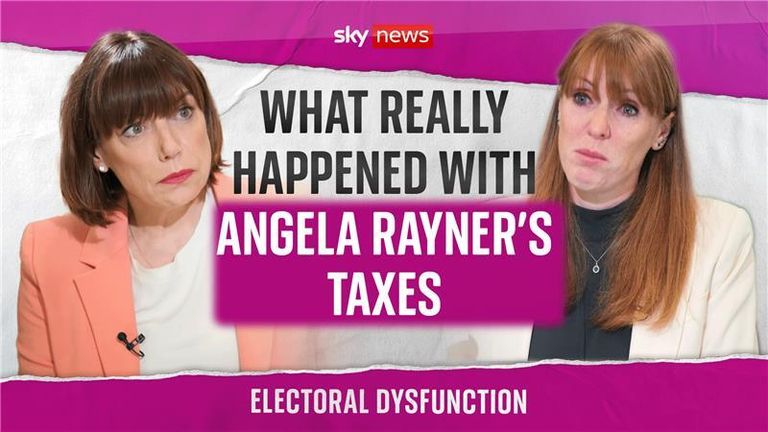Key questions left unanswered in Angela Rayner tax row


Angela Rayner has given a lengthy explanation as to why she underpaid stamp duty on the purchase of her second home, but there are still unanswered questions.
The deputy prime minister has claimed she made an honest mistake as lawyers initially advised her she only owed the basic rate of stamp duty when she bought a flat in Hove in May.
Politics Live: Rayner says ‘tax evader’ graffiti daubed at her home ‘beyond the pale’
She said it was a “complex” situation, as she had sold her stake in her family home in Ashton-under-Lyne, Greater Manchester, to a trust that was set up to provide for her teenage son, who has lifelong disabilities.
This meant she did not technically own the home in Greater Manchester when she purchased the one in East Sussex – but subsequent legal advice said the second home surcharge still applied.
What did Rayner tell her lawyers?
While Ms Rayner has made all these details public, “the crucial question is what she told her conveyancer when she purchased the Hove flat and what advice they gave her based on what she told them”, Patrick Cannon, a tax barrister at Cannon Chambers told Sky News.
“They may have given her wrong advice but she may not have given the full story.”
As set out on the government’s website, if a trust is set up for a child under 18 – as Ms Rayner’s son is – the parent is treated as still owning that dwelling for the purposes of stamp duty. There is an exception if a trustee buys a house for a child under the Mental Capacity Act, but that does not appear to be the case here given the higher tax is owed.
Mr Cannon said that to a tax adviser this is a “readily understandable area of the law” but there are “many solicitors and property lawyers who would not have picked up on this provision”.
Often conveyors will tell their client not to rely on their tax advice but that might depend upon what they know in the first place – and in this case the trust.
As Thomas Wallace, director of the WTT tax group, said: “For correct advice to be given around any potential liability the full facts must be disclosed to the adviser, and this is particularly important where a person’s affairs are complex such as having an involvement with trusts.”
Please use Chrome browser for a more accessible video player

20:00
Angela Rayner’s tax affairs statement in full
Who did Ms Rayner get her advice from?
The cabinet minister has not named who she initially consulted and they can’t speak out because of client confidentiality.
Sky News understands she initially consulted three people before buying the Hove flat – one individual experienced in conveyancing and two experts on the law around trusts.
However, it is not clear if they were experts in tax law.
In a thread on X, tax expert Dan Neidle wrote that if Ms Rayner did not consult the right lawyers then it could be considered carelessness on her part.
But he said it could also be the fault of the lawyers for advising outside their expertise, if they are not a stamp duty specialist.
When will the ethics investigation conclude?
Whether Ms Rayner’s story stands up to scrutiny will ultimately be decided by the prime minister’s independent ethics adviser Sir Laurie Magnus, who is investigating whether a breach of standards took place.
It is not clear how long the probe will last, or what will happen if she has found to have broken the rules.
Sir Keir Starmer has been quick to fire ministers caught up in wrongdoing but it would be a huge blow to his operation to lose someone so senior. Ms Rayner, who is also the housing secretary, is incredibly popular with the Labour membership and was elected by them to be deputy leader of the party.
This means that while she could be sacked as housing secretary and deputy prime minister she would remain deputy party leader unless she chose to step down – triggering a deputy leadership election.
That would be very damaging to Labour after only one year in office and would also question Sir Keir’s judgement – as he has spent days defending Ms Rayner on the airwaves.
What did the PM know and when?
There are questions over what Downing Street knew and when as up until Monday they were insisting the deputy PM had done nothing wrong. Sir Keir even went on the radio to call Ms Rayner a “great British success story” and condemn “briefings against her” as a “mistake”.
In her statement on Wednesday, Ms Rayner did not say when she realised she had paid the incorrect amount of tax, only that she sought expert counsel opinion following media scrutiny and then applied to have a court order lifted which prevented her from speaking about the trust.
Chancellor Rachel Reeves said on Thursday morning that the “definitive advice” on Ms Rayner’s stamp duty arrangements came in on Wednesday morning, but earlier Education Secretary Bridget Phillipson said follow-up advice “came back on Monday”.
Please use Chrome browser for a more accessible video player

2:33
Reeves: I have full confidence in Angela Rayner
Will Rayner be fined?
Even if Ms Rayner survives the ethics investigation, she may not be fully out of the woods. As independent stamp duty expert Sean Randall points out, she could still face a penalty from HMRC. This could be as much as 100% of the tax she owes – reportedly £40,000 – though this is usually negotiated down to 30-40%, according to Mr Randall.
A penalty from HMRC means carelessness rather than dishonesty, but Ms Rayner might find this hard to survive, given she lambasted her Tory opponents for similar mistakes (such as the case with former Tory chairman Nadhim Zahawi).
Mr Randall said that relying on tax advice “is not enough to avoid a penalty” and the deputy prime minister will have to show that she took reasonable steps to get the correct advice and provided all the relevant information to her lawyers.
Do our tax laws need to be changed?
If Ms Rayner is cleared of any rule breaches, it could spark a debate about our tax laws. If they are so complicated that the second most senior person in government can’t understand them, and lawyers get them wrong, does stamp duty need to be changed?
For Mr Cannon and Mr Randall, it was a resounding “yes”. But Mr Randall added: “That question has been around for as long as I have. The stamp duty code is crazy complicated.”